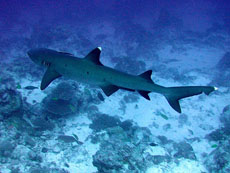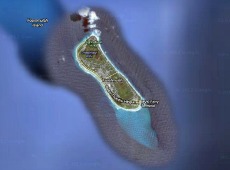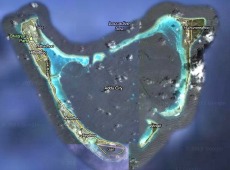The Environment Ministry claims climate mitigation and adaptation projects have not been affected by government instability, however leaked draft Transparency Maldives reports indicate that climate governance institutions are in a state of “flux” and suffer from a lack of accountability, including the proposed Maldives Green Fund.
Currently, the Ministry of Environment and Energy (MEE) is implementing MVR 3.1 billion (US$201,298,810) worth of climate projects, which does not include donor funded programs implemented by “other sectoral agencies” and NGOs, MEE Environment Analyst, and contributor to the MGF’s establishment, Aishath Aileen Niyaz told Minivan News.
In an effort to merge all the currently established trust funds in accordance with the government’s Biosphere Reserve sustainable development policy, President Mohamed Waheed Hassan Manik’s cabinet recently proposed the establishment of a Maldives Green Fund (MGF).
“The Maldives Green Fund is designed to work as a national entity that would comply with international fiduciary standards for enabling, appraising and financing projects,” explained Niyaz.
“The MGF will act as both a funder and guarantor of projects in the areas of renewable energy and energy efficiency, biodiversity conservation, water management, waste management and capacity building and research in these areas,” she continued.
The current US$9.5 million Climate Change Trust Fund (CCTF) and US$138 million the Sustainable Renewable Energy Project (SREP) have been designed to complement the MGF, with both projects allocating resources for MGF capacity building, according to Niyaz.
“It is envisaged that by the time these projects are concluded, the MGF will be in a strong enough position to take manage such funds and take on the lead responsibility for such projects and in the Maldives,” said Niyaz.
She further explained that to protect climate funds from fraudulent practices “checks and balances” are in place, such as government anti-corruption procedures derived from financial laws and regulations, as well as rules of the implementing international organisation.
Niyaz also claims that government instability has not affected climate finance in the Maldives.
“Since most of the [climate change related] projects were ongoing at the time of [the 2012 government] transition, there was no real impact on their implementation. Furthermore, the negotiations for pipeline projects continued on pace,” she stated.
Meanwhile, “It is a general concern from Transparency Maldives’ studies that institutions in the Maldives, including climate institutions, are in a state of flux and not consolidated. New ones are being created and existing ones inactive or ineffective. This results in confusion, waste, delays, and duplications,” states a Transparency Maldives (TM) MGF Policy Brief dated December 17, 2012.
TM estimates that approximately US$160.5 million is being spent on various climate adaptation and mitigation projects through externally funded grants and loans, while an additional US$ 279,480,275 is required for short-medium term (10 years) adaptation and a further US$ 161,500,000 will be needed for long-term (40 years) adaption, states a Transparency Maldives Climate Governance Integrity Mapping of Climate Finance draft report.
“The fact that the state is a transitional democracy, with only emergent institutions of horizontal and vertical accountability, has posed significant challenges to climate change governance. The lack of a legislative framework for the sector also exacerbates the situation,” said the report.
“Moreover, the country is grappling with corruption and lacks effective governance mechanisms to address the issue. In 2010, Maldives was placed at 143rd on Transparency International’s Corruption Perception Index, with an average score of 2.3, indicating that perceived levels of corruption in the country are very high,” it continued.
The Maldives lacks a comprehensible overall institutional framework and comprehensive policy for addressing climate change, which adds to the confusion of the existing climate change mandates, TM identified. Additionally, no comprehensive database of climate projects currently exists.
This has resulted in ad hoc monitoring and evaluation of climate projects and institutional rivalry between ministries, according to TM.
“Another major challenge in climate change governance is the lack of experts in this area. The key climate experts of the country have multiple responsibilities and a very demanding schedule to fulfill their obligations. They are on multiple governing bodies…,” noted the report.
TM also highlighted the challenges that exist for ordinary citizens to gain access to information, including climate change related projects, despite the existence of a regulation on the right to information.
“Given that most official institutions are based in the capital island of Male’, accessing these information is especially challenging for the majority of the population who reside in other islands,” the report stated.
“In principle establishing a ‘green fund’ to consolidate climate change mitigation and adaptation money is ‘ok’ as long as it adheres to international best practices and good governance standards,” Transparency Maldives Climate Governance Senior Project Manager Azim Zahir recently told Minivan News.
Transparency Maldives had not responded to enquiries at time of press.
MGF plan
“One of the aims of the Maldives Green Fund is to roll out the Baa Atoll Conservation Fund – the funding arm supporting the Baa Atoll Biosphere Reserve – model to the entire country,” said Niyaz.
“The MGF will provide access to funds in simpler procedures for the private sector,” she added.
 Essentially the MGF will function “largely as a co-financier of projects, and will work diligently to engage the financial support of other sources”, states a December 2012 draft 2 of the MGF triennial spending strategy 2013-2015.
Essentially the MGF will function “largely as a co-financier of projects, and will work diligently to engage the financial support of other sources”, states a December 2012 draft 2 of the MGF triennial spending strategy 2013-2015.
MGF financial support – in the form of direct grants, interest rate subsidies and soft loans – will be available to “public institutions (including schools, hospitals, etc), small and medium sized enterprises, NGOs, government institutions at all levels, and natural persons,” notes the document. However, it “should be additional to other available sources of finance and not a replacement for them”.
The Maldives government is to provide the initial capital for the MGF, totalling MVR 3 million (US$194,805).
“The Fund’s limited resources will not be used to finance projects or activities that should normally be undertaken by government institutions and financed by government budgets, e.g. compensation and salaries of government authorities, trips of governmental officials to conferences, development of laws and policies, etc.,” both the December draft spending strategy and October 2012 draft 1 operational manual specify.
Despite these proposed regulations for project funding, the December 2012 MGF draft 5 legislation, provides MGF board of directors members remuneration in the form of a “fee for their work” and “reimbursement of expenses” to attend board meetings.
“The level of fees for participation in the work of the Board of Directors shall be defined by the Board of Directors itself, taking into account compensation fees for Board of Directors members of similar government companies established in the Republic of Maldives and complying with the provisions of the President’s Decree as regards maximum permissible levels of administrative costs,” as stated in Fund Governence, section 2 article 12 of the MGF draft legislation.
Compensation for board of directors members is also included under administrative costs in the fund spending policy section four, article 12.
The MGF board of directors will be comprised of a chairperson from the MEE and representatives from the Environmental Protection Agency, Ministry of Finance and Treasury, Local Government Authority, Maldives National Chamber of Commerce and Industries, as well as Maldives Association of Tourism Industry and a non-governmental environmental organisation.
The 2013 budget will allocate US$166,320 for personnel compensation and US$7,000 for administrative expenditures.
However, the MGF education and research priority area will receive US$66,690.
As a supervisory mechanism, the MGF will establish an independent integrity unit and redress mechanism that will report to the board of directors, as specified in the draft legislation section 5 article 16.
“In line with the provisions of the President’s Decree, the Ministry of Environment and Energy [providing a chairperson for the MGF board] shall receive full and unrestricted cooperation from the Fund in order to exercise adequate administrative control and supervision of the Fund’s operations,” reads draft legislation section 2 article 43.
The draft legislation, operations manual, and triennial spending strategy documents were prepared by Æquilibrium Consulting for the MEE.
MGF recommendations
MGF documents, including the Operations Manual and Legislation were not provided to stakeholders like Transparency Maldives prior to the stakeholder conference on 11 December finalising MGF documents, TM claimed in their Maldives Green Fund Policy Brief.
Despite being given “insufficient time (a week)… to comment more specifically and comprehensively on documents of such a technical nature,” TM highlighted a number of MGF issues.
They recommend that the MGF be established through People’s Majlis (Parliament) legislation, not Presidential Decree, given that the “MGF is created to handle large sums of public money and projects and programme implemented for the public”, said the policy brief.
Presidential Decree, given that the “MGF is created to handle large sums of public money and projects and programme implemented for the public”, said the policy brief.
TM also identified the potential for MGF board members to have conflicts of interest which would “compromise independence of the directors” and recommended the government reconsider appointing an independent board.
They also “encourage that declarations of financial interests and disclosure of conflicts of interest be made public,” noted the policy brief.
Given that “minimal reference” is made to or incorporated from the Code of Corporate Governance, TM also recommended a code of conduct be established for all MGF employees which elaborates mechanisms, responsibilities, operations, and practices.
“Bringing forward” educational awareness and research activities is also emphasised, to ensure these activities “have the necessary impact during project cycles”.
Likes (3)Dislikes
(3)Dislikes (1)
(1)  Reefs have been “heavily modified” over the past 30 years – due to the lack of “concurrent precautionary management” – as “resource exploitation has expanded to meet the demands of an increased human / tourist population,” the report added.
Reefs have been “heavily modified” over the past 30 years – due to the lack of “concurrent precautionary management” – as “resource exploitation has expanded to meet the demands of an increased human / tourist population,” the report added. inappropriate atoll development, sedimentation, and pollution were also identified as key threats.
inappropriate atoll development, sedimentation, and pollution were also identified as key threats. Essentially the MGF will function “largely as a co-financier of projects, and will work diligently to engage the financial support of other sources”, states a December 2012 draft 2 of the MGF triennial spending strategy 2013-2015.
Essentially the MGF will function “largely as a co-financier of projects, and will work diligently to engage the financial support of other sources”, states a December 2012 draft 2 of the MGF triennial spending strategy 2013-2015. Presidential Decree, given that the “MGF is created to handle large sums of public money and projects and programme implemented for the public”, said the policy brief.
Presidential Decree, given that the “MGF is created to handle large sums of public money and projects and programme implemented for the public”, said the policy brief. “The root cause of the problem is administrative – the lack of clear mandates between who is doing what,” the source said. “There are also ministerial rivalries regarding certain projects because clear mandates are lacking.”
“The root cause of the problem is administrative – the lack of clear mandates between who is doing what,” the source said. “There are also ministerial rivalries regarding certain projects because clear mandates are lacking.”
